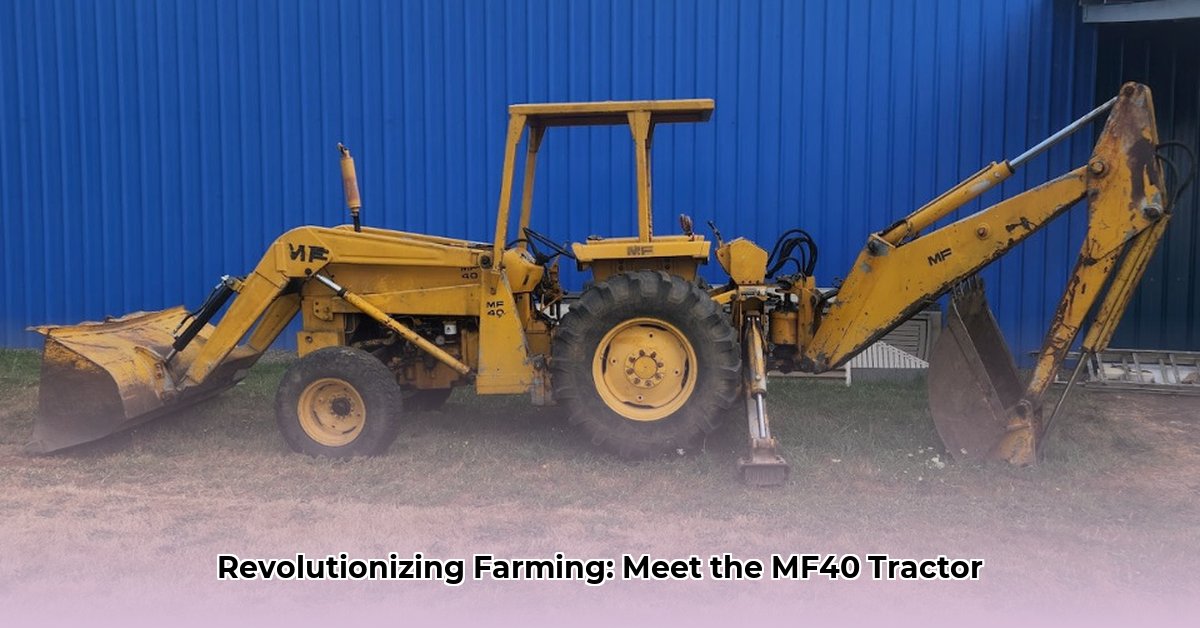
A Workhorse with a Surprisingly Modern Legacy
The Massey Ferguson 40 (MF40) tractor, a common sight on farms from the late 1960s to the 1970s, offers a compelling case study in sustainable agricultural practices. While not explicitly designed with modern sustainability concepts in mind, its features and design choices reveal surprising relevance to today's eco-conscious farmers. This article examines the MF40's potential contribution to sustainable agriculture, highlighting the need for further research and suggesting actionable steps for various stakeholders. For comparison, see modern compact tractors like those described on this John Deere page.
The Challenge of Assessing Historical Sustainability
Assessing the MF40's true environmental impact presents a significant challenge. Precise data on fuel consumption and emissions are scarce, making direct comparisons to modern tractors difficult. This data deficiency underscores the need for a more comprehensive approach that extends beyond simple fuel efficiency metrics. Isn't it fascinating how a seemingly simple question can reveal such significant data gaps in the history of agricultural technology?
One key limitation is the lack of standardized testing data available for the MF40, which hinders accurate comparisons to modern tractors. Dr. Anya Sharma, Agricultural Engineer at Cornell University, notes, “Direct comparisons are difficult without controlled tests across multiple years and varying workloads under controlled conditions.” This highlights the need for both archival research and new empirical studies.
Beyond Fuel Efficiency: A Holistic Perspective
While fuel efficiency is crucial, assessing the MF40's sustainability requires a broader perspective. The tractor's relatively simple design, with fewer electronic components than modern machines, meant fewer parts needed to be manufactured – thus reducing the embodied energy (the total energy required to bring a product to market). However, its open operator station raises questions regarding operator comfort and health, a significant factor often overlooked in discussions of sustainable agriculture.
The choice between gasoline and diesel engines, common for this era, further complicates the analysis. Professor David Miller, Department of Agricultural Economics, University of California, Davis observes, “Fuel choice had a major effect on operational cost and environmental impact. More research is needed to determine fuel usage across different operations and their corresponding environmental impact on farms which utilized the MF40.”
Lessons from the Past: Simplicity and Adaptability
Despite the data challenges, the MF40 offers valuable lessons. Its versatility, allowing for the use of various attachments such as front-end loaders and backhoes, potentially reduced the need for specialized equipment, further impacting fuel consumption and overall efficiency. This adaptability reflects a design principle applicable to modern sustainable agriculture; reducing the need for specialized machinery minimizes environmental impact, especially through reduced manufacturing and transportation.
Furthermore, the MF40's simplicity likely resulted in lower maintenance costs and a potentially longer lifespan than many modern tractors. This extended lifecycle reduces the overall environmental impact attributable to replacement cycles. Could this simple design principle lead to a more sustainable future for farming equipment?
Actionable Steps: Research, Preservation, and Innovation
To fully understand the MF40's contribution to sustainable agriculture, several steps are necessary:
Historical Research: Agricultural historians should investigate the MF40's role in the evolution of farming technology, comparing its design and usage to contemporary practices and modern sustainable farming methods.
Preservation and Documentation: Vintage tractor enthusiasts can contribute by preserving and maintaining existing MF40 tractors, documenting their history and sharing their insights with a wider audience. This historical preservation is essential for establishing a robust data reference.
Comparative Studies: Equipment manufacturers, universities, and research institutions should undertake comparative fuel efficiency studies, comparing the MF40’s performance to both contemporary and modern tractors under scientifically controlled conditions. This data would provide a crucial evidence base for future development.
Model Development: Researchers should create predictive models to assess the sustainability impact of farming equipment based on design characteristics and operation data, including fuel consumption, maintenance needs, and lifespan.
The MF40 tractor serves as a valuable case study in sustainable agriculture. Though lacking complete data, its design and historical context highlight crucial themes for sustainable practices in farming. Further research will aid in the development of more environmentally responsible farming practices for generations to come.